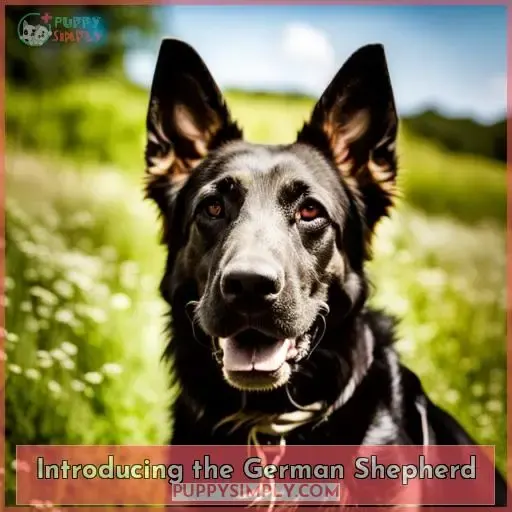This site is supported by our readers. We may earn a commission, at no cost to you, if you purchase through links.
 While your clever German Shepherd impresses with obedience, these intelligent dogs surprise with intuition meeting your needs.
While your clever German Shepherd impresses with obedience, these intelligent dogs surprise with intuition meeting your needs.
Bonding closely under your care, they adapt responding to routines but read situations deciding when extra vigilance smartly serves their family.
Adjusting their capability and spiritedness fits your lifestyle, their wit shines brightest matching your energy.
Table Of Contents
- Key Takeaways
- Introducing the German Shepherd
- History and Origins
- Intelligence and Trainability
- Common Traits and Temperament
- Living With a German Shepherd
- Are German Shepherds Good Family Dogs?
- German Shepherd Health and Lifespan
- Is a German Shepherd Right for You?
- Frequently Asked Questions (FAQs)
- Conclusion
Key Takeaways
- Known for their high working intelligence – ability to learn complex commands, remain attentive to handlers, and problem solve independently.
- Intelligence and success depend greatly on having an active owner committed to regular rigorous exercise and training.
- Possess attentiveness, loyalty, and protectiveness towards family members.
- Require ample daily physical and mental stimulation to prevent behavioral issues – around 90 minutes of exercise plus training, games, and puzzles.
Introducing the German Shepherd
You’re looking at a medium to large dog with an athletic build, striking appearance, and an intense gaze that gives away its loyal, energetic, intelligent, and protective temperament.
This is the German Shepherd – a breed known for its versatility and working intelligence.
Originally developed in Germany in the late 1800s by Max Von Stephanitz as a herding dog capable of performing various tasks on farms, the German Shepherd has since become one of the most popular breeds worldwide.
Its coat variations include black/tan or sable colors with both short-haired and long-haired varieties recognized by breed standards.
With their wolf ancestry evident in their physical traits such as pointed ears and almond-shaped eyes; they’ve also made appearances in pop culture through movies like Rin Tin Tin’s iconic role during Hollywood’s early days.
History and Origins
One developed this versatile breed in Germany in the late 1800s to create the ideal herding dog.
You’re looking at Max Von Stephanitz, who founded the Verein für Deutsche Schäferhunde in 1899 to promote the fledgling German Shepherd breed.
The club helped standardize the breed and preserve key traits like intelligence, loyalty, and trainability that made German Shepherds excel as herding dogs.
This set the stage for their widespread use as police, military, and service dogs in the 20th century.
Their intelligence, protective nature, confidence, and adaptability cemented their status among the most popular working dog breeds globally.
The Verein für Deutsche Schäferhunde was pivotal in shaping the evolution of the German Shepherd breed.
Intelligence and Trainability
When assessing canine intelligence, it’s important to consider working intelligence – a breed’s ability to learn from and cooperate with humans.
As a breed developed specifically for herding and obedience-based tasks, German Shepherds excel in working intelligence, easily learning complex commands and remaining attentive to their handlers.
This high degree of biddability, paired with sound adaptive skills for independent problem-solving, is what makes German Shepherds such capable working dogs suited to roles like search and rescue.
Working Intelligence
Your German Shepherd’s intelligence shines through its exceptional ability to learn from and cooperate with humans.
This working intelligence makes them well-suited for demanding tasks like search and rescue, disability assistance, police work, and herding.
Their trainability, focus, problem-solving skills, and desire to work with people set them apart from less biddable breeds.
Even so, their success depends greatly on an active owner committed to bringing out their potential.
Adaptive Intelligence
You’ll also find German Shepherds possess keen adaptive intelligence, seen in their ability to adeptly problem-solve and learn complex behaviors:
- Can solve puzzles and challenges independently.
- Learn quickly through observation.
- Apply new knowledge to novel situations.
- Utilize scent-tracking to follow trails.
Common Traits and Temperament
These intelligent canines also possess a distinctive temperament—you’re likely to observe their loyalty and attentiveness as they focus their gaze on you.
German Shepherds exhibit great intelligence, though this differs from obedience. Their behavioral characteristics showcase high working and adaptive intelligence through trainability, problem-solving, and cognitive skills.
However, environment and training approaches influence results. Inexperienced owners may curb natural instincts.
When properly nurtured, these adaptable dogs reveal uncanny perceptiveness, attentiveness, and protectiveness towards family members. Their temperamental traits should suit most individuals seeking loyal companions.
However, be aware – intelligence manifests uniquely in each dog. Cater training to capitalize on German Shepherds’ canine cognitive talents.
Living With a German Shepherd
Owning a German Shepherd requires an active lifestyle and daily rigorous exercise, preferably 90 minutes per day.
Mental stimulation through training, games, and puzzle toys is also essential to prevent boredom and behavioral issues.
As heavy shedders and chewers, German Shepherds need weekly brushing and plenty of durable chew toys.
Exercise Needs
To meet the exercise needs of a German Shepherd, it’s important to provide them with at least 90 minutes of physical activity every day.
Outdoor activities like hiking, running, and playing games of fetch allow them to expend energy.
Providing both mental and physical stimulation is key to keeping your intelligent dog happy and fit.
Know that their protective instincts can make dog parks challenging, so supervised playtimes work best.
With the right fitness regimen, your adaptable companion will thrive in your home.
Mental Stimulation
How Smart Are These Capable, Adaptable Dogs?
Your bright German Shepherd craves brain-boosting games and puzzles in her daily routine.
- Canine puzzles
- Obedience training
- Interactive toys
- Backyard agility
- Snuffle mats
Are German Shepherds Good Family Dogs?
Because they’re loyal, gentle, and protective, you’re likely wondering if German Shepherds make good family dogs.
As intelligent, eager-to-please herding dogs, German Shepherds can thrive in families when properly socialized and trained.
To ensure good behavior, socialize your German Shepherd to children and other pets early and often.
Engage in bonding activities like agility, hide-and-seek games, or learning tricks together.
Use positive reinforcement when training appropriate interaction with children.
Never leave young children unsupervised with any dog.
With early socialization and continued training, German Shepherds’ loyalty and gentleness make them excellent family companions.
| Advantages | Disadvantages |
|---|---|
| Loyal and protective | Require ample exercise |
| Gentle and affectionate | Prone to behavioral issues without training |
| Eager to please and highly trainable | Heavy shedders |
German Shepherd Health and Lifespan
Seven common health issues can impact your German Shepherd’s lifespan of 9 to 13 years:
- Hip and elbow dysplasia
- Bloat
- Degenerative myelopathy
Engaging in preventive care through diet, exercise, mental stimulation, vet visits, and genetic testing helps safeguard your dog’s health and longevity.
Other prevalent conditions include:
- Allergies
- Arthritis
- Cancer
- Heart disease
Though large breeds like German Shepherds generally have shorter lifespans than small dogs, providing excellent nutrition, regular veterinary care, daily exercise, and a stimulating home environment can help optimize your loyal companion’s well-being and lifespan potential.
Taking proactive measures allows you to spend more quality years with your intelligent, adaptable dog.
Is a German Shepherd Right for You?
Having covered their health and lifespan, let’s examine whether the intelligent, energetic German Shepherd is the right dog breed for your lifestyle and living situation.
As an adaptable yet demanding breed, several key factors should guide your decision:
- Their high intelligence requires ongoing mental stimulation to prevent destructive behaviors.
- Their herding heritage makes them highly biddable, but proper socialization is still essential.
- Their protective nature can lead to aggression without a strong bond and leadership from you.
With considerable physical and mental exercise, clear communication, plus strong motivation on both sides, this versatile breed can thrive in many households.
Yet their needs for activity and attention must align with your abilities as an owner.
Thoughtfully assess if you can provide the dedication to raise a happy, well-adjusted German Shepherd.
Frequently Asked Questions (FAQs)
How much do German Shepherd puppies cost?
German Shepherd puppies typically cost between $500 to $1,
Factors like lineage, breeder reputation, and location can influence the price.
As an intelligent and active breed requiring plenty of care, ensure you thoroughly research costs beyond the initial purchase.
Do German Shepherds do well in small homes or apartments?
Unfortunately, German Shepherds typically don’t thrive in small homes or apartments.
Their high energy levels and need for regular vigorous exercise make it challenging to provide adequate physical and mental stimulation without access to a yard.
Consider if a smaller or lower energy breed would better suit your lifestyle before committing to a German Shepherd in confined living quarters.
What kind of toys and activities do German Shepherds enjoy?
As intelligent dogs, German Shepherds enjoy mentally stimulating toys and activities.
Try challenging puzzle toys that require problem-solving to access hidden treats.
They also love fetching balls and Frisbees, playing tug of war, learning new commands and tricks, and interactive nose work games that engage their keen sense of smell.
Consistent mental and physical exercise keeps them happily occupied.
How do I introduce a German Shepherd to other pets?
Initially introduce them slowly, keeping interactions positive with treats and praise.
Never force interactions – take it at their pace so they feel safe.
With patience and calm, gentle guidance, your German Shepherd will likely accept the other pets.
What type of regular grooming is needed for a German Shepherd?
A German Shepherd needs regular brushing, about once a week, to remove loose hair and prevent matting.
Check ears weekly for dirt and wax buildup.
Trim nails monthly to avoid overgrowth and cracking.
Brush teeth 2-3 times a week to promote gum health and reduce tartar buildup.
This breed benefits from regular at-home grooming between professional groomings every 4-6 weeks.
Conclusion
With near-human wit, these extraordinarily brilliant canines adapt their spirited capability to closely bond and meet your family’s needs.
Their agile intuition reads situations, deciding when extra vigilance smartly serves.
Though demanding, their shining obedience and trainability make German Shepherds ideal for many lifestyles if properly exercised and stimulated.
Still, their needs give pause before welcoming one of these wonderful dogs into your life.














